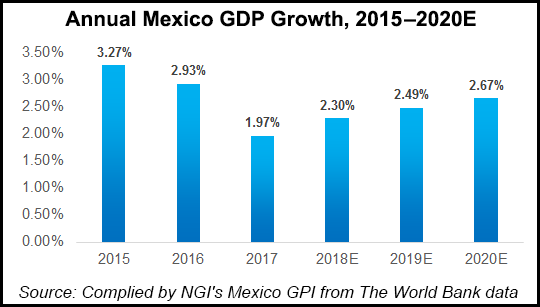Regulatory | E&P | Infrastructure | Markets | Mexico | NGI All News Access | NGI Mexico GPI | NGI The Weekly Gas Market Report
Mexico CRE Laying Off 60% of Workforce
Mexico’s Comisión Reguladora de EnergÃa (CRE) will lay off 367 temporary employees, or 60% of its total workforce, by the end of this month, multiple commissioners and employees have confirmed.

“Sad day for all of us who work at the CRE,” as 367 temporary workers “were asked to hand in their resignations due to lack of certainty over their contracts being renewed in 2019,” Commissioner Luis Guillermo Pineda Bernal wrote on Twitter.
The announced layoffs follow the publication earlier this month of President Andrés Manuel López Obrador’s proposed 2019 budget, which included a 31.1% budget cut for CRE.
CRE’s responsibilities in the natural gas segment include awarding infrastructure permits for pipelines, compressor stations, storage capacity and liquefied natural gas terminals. It also handles permits for gas imports, transportation, compression, liquefaction, regasification commercialization and distribution.
CRE also oversees price reporting in the natural gas sector and publishes the IPGN, a monthly index of prices reported by market participants. In addition, it has the final say on initiatives such as the marketing contract release program of state-owned Petróleos Mexicanos (Pemex), capacity open seasons by national pipeline grid operator Cenagas, and rules for a secondary market for transport capacity.
It was still unclear how the budget cuts and layoffs would affect the development of Mexico’s natural gas market.
López Obrador has said almost “nothing about both natural gas and [the] storage, distribution and transportation of fuels,” consultant Luis Miguel Labardini, a partner at Mexico City-based Marcos y Asociados, told NGI. “The creation of a market, both for natural gas and for fuels, is very important for the efficiency of the market…almost as important as producing fuels.”
The layoffs, Labardini said, are “going to cripple the CRE’s capacity to operate…It’s a bad omen.”
López Obrador, as well as the CEOs of Pemex and state power utility Comisión Federal de Electricidad (CFE), have each complained publicly of unnecessary red tape imposed on government-owned firms by CRE and the Comisión Nacional de Hidrocarburos, or CNH. Natural gas shippers have cited burdensome and time-consuming permitting processes as an impediment to developing a robust and liquid natural gas market in Mexico.
In November, CRE announced a series of measures to streamline permitting in the natural gas, oil products, LPG, and electricity segments.
In addition to the layoffs, experts have warned that López Obrador’s austerity plan, a campaign promise based largely on slashing the salaries of high-ranking government officials, could lead to an exodus of talent from Mexico’s public energy sector.
While at CRE the layoffs were restricted to “trabajadores eventuales,” a category of temporary workers, many have worked for years or decades at the commission.
Commissioner Montserrat Ramiro Ximenez on Twitter said her assistant, a 25-year veteran of the CRE, was among the unlucky casualties of the budget cut.
And CRE President, Guillermo Ignacio GarcÃa Alcocer tweeted that many bureaucracies “depend in large part on temporary employees, whose salaries were renewed every three months.”
© 2024 Natural Gas Intelligence. All rights reserved.
ISSN © 1532-1231 | ISSN © 2577-9877 | ISSN © 2577-9966 | ISSN © 1532-1266 |
